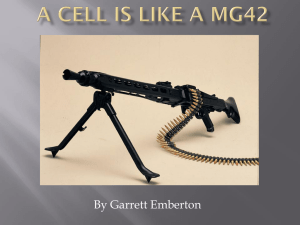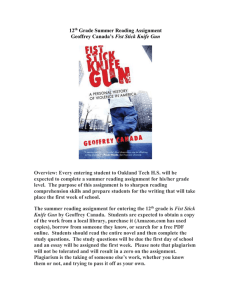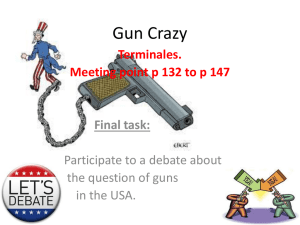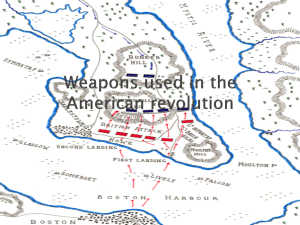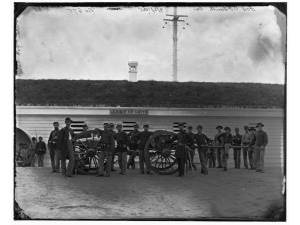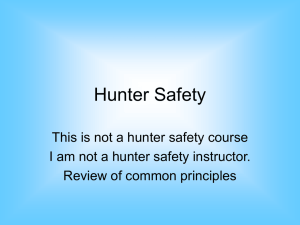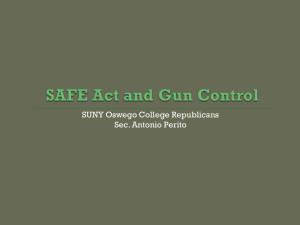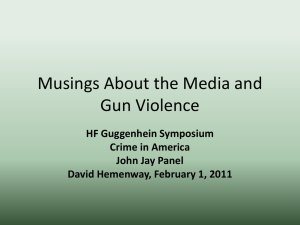Gun safety, cleaning and maintenance
advertisement
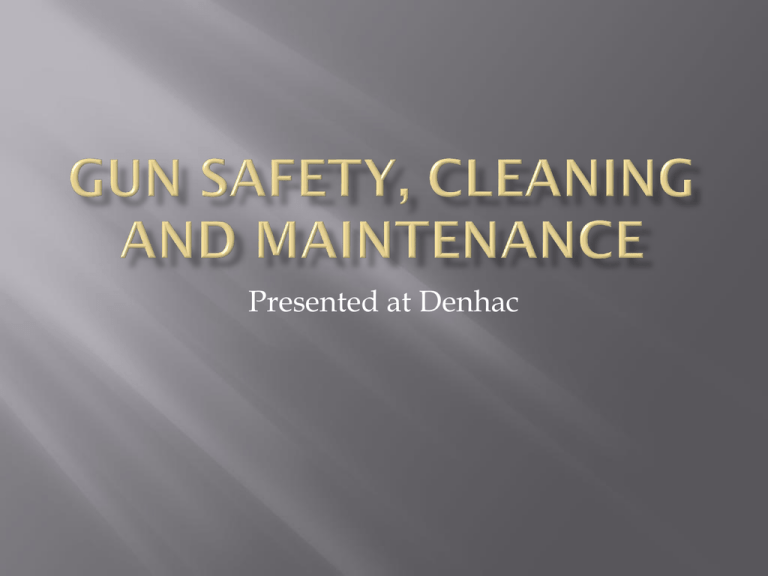
Presented at Denhac Over 30 years experience with various firearms. Former law enforcement liaison for Dave’s Gun’s in Denver. Grew up in a law enforcement/hunting family. Avid sport shooter. Former Glock armorer. 10 years law enforcement experience. Experienced gun owner. YOU ARE ULTIMATELY RESPONSIBLE FOR YOUR OWN SAFETY AND EVERYONE ELSES IN THE ROOM!!! ABSOLUTELY NO AMMUNITION IS ALLOWED IN THE BUILDING DURING THE CLASS. I AM NOT AN EXPERT… The NRA Your local gun shop Local Gun clubs (RMGO) Concealed carry classes Hunter’s safety courses Thunder Ranch, etc Experience, experience, experience To present the BASIC rules of firearms safety, cleaning, storage, and maintenance. To present the BASIC myths of firearms ownership and safety. To present the BASICS of ballistics and explain the three types of ballistics. To help you become a SAFER and more confident gun owner. Know them, live them, eat them, sleep them, breath them, be them… Be an example for everyone around you!!! Remember, who is responsible for gun safety? 1) ALWAYS treat EVERY gun as if it were loaded! 2) NEVER let the muzzle of a weapon cover ANYTHING you are not willing to DESTROY! 3) Keep your finger OFF the trigger and out of the trigger guard until your sights are on the target and you are ready to shoot! 4) Always be aware of your target and what is beyond it! What is an “AD”… An “Accidental Discharge” How do we check to see if a gun is unloaded? Follow the rules of firearms safety. Keep all ammunition in ANOTHER ROOM when cleaning/practicing with/sleeping with your gun! If in doubt take it to a gunsmith! Follow all manufacturers recommendations! If you own a gun YOU WILL have an accidental discharge; all you can do is make sure no one gets hurt when it happens! Long guns – Rifles, shotguns, grenade launchers, and some weapons of mass destruction :-D Handguns – Pistols, “Derringers”, palm pistols, bang stix, etc. Always check state and local laws for the legality of both long guns and handguns. The NFA (National Firearms Act) Bolt Pump Semi Full Lever “Safe action” Rolling block Trap door Double/single (There are others out there) Definition – Ballistics is the science that deals with motion, behavior, and the effects of projectiles, especially bullets, gravity bombs and rockets. Three types of ballistics. - Internal - External - Terminal (Everyone’s Favorite) Internal – The behavior of a projectile from the time of its propellant’s ignition until it exits the barrel. External – The behavior of a non-powered projectile in flight. (Arguably the most complicated) Terminal – Sometimes called “Transitional” is the behavior of the projectile as it comes to rest in a medium. http://youtube.com/watch?v=O1sGj4EFCjk Always follow manufacturers recommendations. Invest in a proper cleaning kit. Gun cleaning is a part of gun ownership. A dirty gun is a dangerous gun. Use the appropriate solvents and oils (Hoppe’s, etc) Do NOT over-oil or over-grease. Know how to disassemble/reassemble your weapon. Function checks. If in doubt GO TO A GUNSMITH. Lights Lasers Optics ALWAYS follow your manufacturers recommendations. Do not apply gun cleaning solvents to the above items; remove them from the gun prior to cleaning if necessary. Check “return to zero” on all optics and lasers after cleaning or removing them. Do you own a gun safe? You should! Dessicant Chemical Electronic Cosmoline Gun socks Ammunition cans Batteries? (They leak!) Fire? This will “cut ‘em in half” - seriously? This will blow them off their feet – It’s basic physics. Hollywood’s “one shot, one kill” MOA – Minute of angle… This is true but I’ve never met anyone who can shoot the nuts off of a flea at 1000 yards! The “Iraqi off-hand” “Why didn’t the cops just shoot the gun out of his hand?” “Silencers” – Suppressors… Sorry, It just doesn’t work that way. What myths have you heard? Questions?
